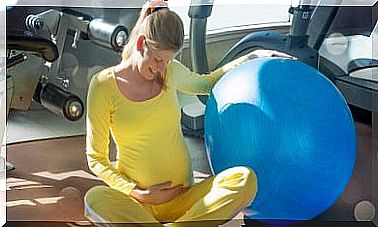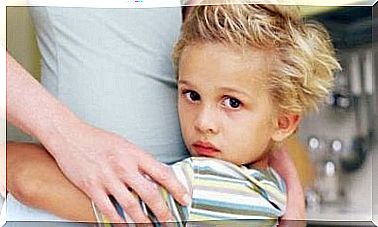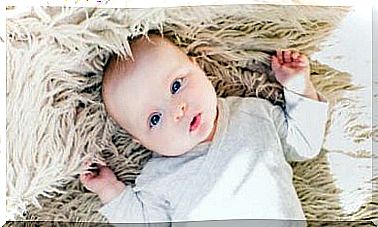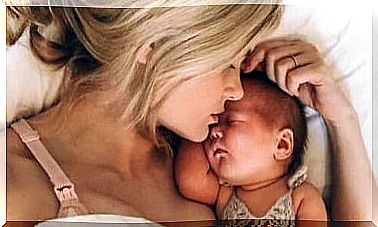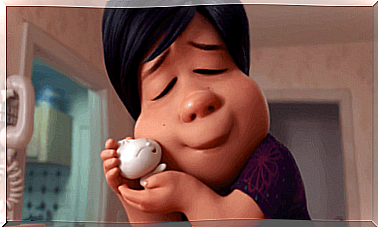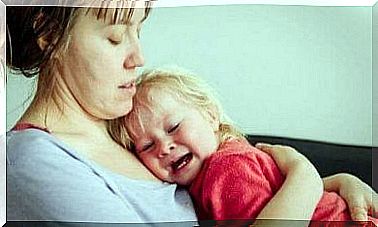Hugging And Comforting Is Not To Spoil, But To Educate

Pampering has nothing to do with comforting your child, meeting their needs, calming their fears, or giving them hugs and caresses. Parents who do not raise their children properly are the very ones who ignore them, abandon them, make the mistake of thinking that a baby’s brain is like that of an adult who understands manipulation or blackmail.
An interesting study on affective intelligence showed that most babies experience psychological pain during the day. Much more than physical pain. This is undoubtedly worth taking into account. The emotional suffering of children is related to factors such as hunger, fear or insecurity.
These are instinctive factors that indicate an authentic discomfort. It’s something that every child will show in a certain way, different from how another child will. For that reason , as mothers, we need to understand the specific behaviors of each of our children. We should know that taking care of their needs does not mean spoiling them.
We invite you to delve into this topic, which sometimes generates controversy.
Comfort: the art of understanding needs
If a friend of yours is crying, don’t let him cry until he has no more tears. If your partner, sister, or father is crying, don’t leave the room until they’ve stopped crying. Why else would you do that to your child?
Comforting is the exceptional art of knowing what a person needs and then applying proper care to heal their psychological or emotional pains. That’s why sometimes it’s not enough just to say , “Calm down, it’s going to be okay.”
What gives a small child the greatest comfort is physical contact and a voice that speaks calmly and intimately.

These are little things that develop authentic imprints in a growing baby’s brain. Any stimulus, as well as the lack of a stimulus, will determine the further development of a baby.
Let’s look at a few more interesting aspects.
Raising a child’s wisdom well
Words are important in a language. Sometimes the most popular expressions try to define deviant behavior when in reality they are natural behaviors. For example, you may well have experienced the situation where you had to let the comments of your friends or family come over you when you held your child in your arms to ease his crying or anger.
“You spoil him” they say. You remain silent, because you know this is not the case. You understand that positive attention at the right time prevents tantrums, reduces stress and makes your child feel more confident to explore his environment at his own pace.
The wisdom of proper child rearing is knowing the consequences of prolonged and unattended crying. From a neurological point of view, it causes stress. A high level of cortisol, the stress hormone, changes the functioning of neurotransmitters. It therefore increases the feeling of fear and creates a greater need for attention.
A good caregiver also knows that comforting, embracing and ‘being present’ improves the bond with the child. Our children need this secure attachment for the first three years of life. It is a stage where their vital needs are often simple, but essential:
- safety
- affection
- recognition
- enjoy enriching stimulation that promotes nerve stimulation
A child who makes you cry until he runs out of energy or doesn’t get hugs or caresses is a baby who builds up a somewhat hostile view of the world, with a scenario where he “will always want” and will live in a world where he feels the need to defend oneself, sometimes with anger.
This is not good enough.

Promote emotional development to help your child grow
Emotional education only starts when a child is already communicative, when we have already set rules, set boundaries and negotiated the rules. An 8 month old who pulls your hair when he gets angry is someone who is trying to channel his anger and frustration.
Emotional education starts from the first day you put your baby in the crib after returning home from the hospital after delivery. We must not forget that the first emotional impressions start at birth with the first skin-to-skin contact between the baby and its mother.
Breastfeeding is a wonderful pillar to further build this bond and convey security, calmness and well-being. Later, the art of respectful comfort will allow you to help your child grow in a safe environment.
Ignoring negative reactions won’t spoil your child either. The 2-year-old boy who throws a toy on the floor in anger, or scratches his brother or mother, is dealing with an emotion that he does not yet understand and that he must learn to recognize, understand and manage.

The task of understanding and dealing with emotions requires science and intuition. Precisely because they are small, we should never overlook that in children. Today’s little things can be transformed into tomorrow’s giants. Therefore, it is imperative that we pay attention, feed them with positive emotions and practice the art of raising children well.
